Thawing a turkey is a crucial step in preparing it for cooking. But what do you do if you thawed the turkey but can’t cook it right away? How long can you keep a thawed turkey in the refrigerator before it becomes unsafe to eat?
In this article, I will answer these questions and provide some additional information about safe thawing, storage, and preparation of turkey.

According to the USDA, it takes about 24 hours for every four to five pounds of whole turkey to thaw in the refrigerator. Once the turkey is thawed, you can keep it in the refrigerator for one to two additional days before cooking.
However, if you thawed your turkey using other methods, such as cold water or microwave, it cannot be refrozen and should be cooked immediately to minimize the growth of harmful bacteria.
Proper thawing and storage of turkey is essential to prevent foodborne illnesses. In this article, I will discuss safe thawing methods, how to store a thawed turkey, how to prepare and cook it, and how to recognize signs of spoilage.
I will also provide some special considerations for Thanksgiving and answer some frequently asked questions about thawing and storing turkey.
Key Takeaways
- Thawed turkey can be stored in the refrigerator for one to two days before cooking.
- Safe thawing, storage, preparation, and cooking of turkey are essential to prevent foodborne illnesses.
- Recognizing signs of spoilage and following special considerations for Thanksgiving can help ensure a safe and enjoyable meal.
Understanding Thawed Turkey
When it comes to thawed turkey, it is important to know how long it can be kept in the refrigerator. According to the USDA, it takes approximately 24 hours for every four to five pounds of whole turkey to thaw in the refrigerator.
Once the turkey is thawed, it can be kept in the refrigerator for one to two additional days before cooking.
It is important to note that if you thawed your turkey using other means, such as cold water or a microwave, it cannot be refrozen and should be cooked immediately to minimize the growth of harmful bacteria.
The FSIS advises that a turkey thawed by the cold water method should be cooked immediately.
When storing thawed turkey in the refrigerator, it should be kept in its original packaging or wrapped tightly in plastic wrap or aluminum foil.
It is also important to keep the turkey on the bottom shelf of the refrigerator to prevent any juices from dripping onto other foods and causing cross-contamination.
It is important to remember that the guidelines for storing thawed turkey in the refrigerator apply to both whole turkeys and turkey breasts. If you have a thawed turkey breast, it can be kept in the refrigerator for one to two additional days before cooking.
Overall, it is essential to follow proper food safety guidelines when storing thawed turkey in the refrigerator. By doing so, you can ensure that your turkey is safe to eat and free from harmful bacteria.
Thawing Methods
When it comes to thawing a turkey, there are three main methods: refrigerator thawing, cold water thawing, and microwave thawing. Each method has its own advantages and disadvantages, so it’s important to choose the one that works best for you.
Refrigerator Thawing
Refrigerator thawing is the safest and most recommended method for thawing a turkey. Simply place the frozen turkey in the refrigerator and allow it to thaw slowly over time. The general rule of thumb is to allow approximately 24 hours of thawing time for every 4-5 pounds of turkey.
One of the biggest advantages of refrigerator thawing is that it is the safest method for thawing a turkey. The turkey will thaw at a consistent and safe temperature, reducing the risk of bacterial growth.
Additionally, once the turkey is thawed, it can be kept in the refrigerator for an additional 1-2 days before cooking.
Cold Water Thawing
Cold water thawing is a faster method for thawing a turkey, but it requires a bit more effort. To thaw a turkey using this method, place the turkey in a large container of cold water.
Change the water every 30 minutes to ensure that it stays cold. The general rule of thumb is to allow approximately 30 minutes of thawing time for every pound of turkey.
One of the biggest advantages of cold water thawing is that it is faster than refrigerator thawing. However, it is important to note that this method requires more attention and effort to ensure that the water stays cold and the turkey thaws safely.
Microwave Thawing
Microwave thawing is the fastest method for thawing a turkey, but it is also the riskiest. To thaw a turkey using this method, place the turkey in the microwave and use the defrost setting. Be sure to follow the manufacturer’s instructions for defrosting a turkey in the microwave.
One of the biggest advantages of microwave thawing is that it is the fastest method. However, it is important to note that this method can be risky because the turkey can start to cook in some areas while other areas are still frozen.
Additionally, this method is not recommended for larger turkeys because it can be difficult to ensure that the turkey thaws evenly.
Overall, refrigerator thawing is the safest and most recommended method for thawing a turkey. However, if you need to thaw a turkey quickly, cold water thawing can be a good option. Microwave thawing should only be used as a last resort and with extreme caution.
Safe Storage of Thawed Turkey
When it comes to storing thawed turkey, it’s essential to follow proper food safety guidelines to avoid the risk of foodborne illness. Here are some tips on how to safely store your thawed turkey.
In the Refrigerator
If you’ve thawed your turkey in the refrigerator, you can safely store it in the fridge for 1-2 days before cooking. According to the USDA, it takes approximately 24 hours for every four to five pounds of turkey to thaw in the refrigerator.
Once the turkey is thawed, you can keep it in the refrigerator for one to two additional days before cooking.
To store your thawed turkey in the refrigerator, place it on a tray or in a container to catch any drips. Make sure the turkey is wrapped tightly in plastic or aluminum foil to prevent contamination.
Do not store any other food items in the same refrigerator space as the turkey to avoid cross-contamination.
In the Freezer
If you’re not planning to cook your turkey right away, you can store it in the freezer for later use. According to the USDA, it’s safe to store a fresh whole turkey in the freezer for up to one year. However, if you’ve thawed your turkey, you should not refreeze it.
To store your turkey in the freezer, wrap it tightly in plastic wrap or aluminum foil, or use a vacuum-sealed bag to prevent freezer burn. You can also store the turkey in an airtight container or freezer-safe bag. Make sure to label the turkey with the date it was frozen to keep track of its storage time.
It’s important to note that refreezing a thawed turkey can affect its quality and texture. Therefore, it’s best to cook the turkey as soon as possible after it has been thawed.
In summary, storing thawed turkey requires proper handling and storage to avoid the risk of foodborne illness. By following these guidelines, you can safely store your turkey in the fridge or freezer for later use.
Preparation and Cooking of Thawed Turkey

When it comes to cooking a thawed turkey, preparation is key. Proper preparation ensures that the turkey is cooked evenly and safely. In this section, I will cover the preparation and cooking of a thawed turkey, including the necessary utensils, cooking times, and turkey size considerations.
Preparation
Before cooking a thawed turkey, it is important to properly prepare it. Here are the steps for preparing a thawed turkey:
- Remove the turkey from the refrigerator and let it sit at room temperature for 30 minutes to an hour.
- Preheat the oven to 325°F.
- Remove the giblets and neck from the cavity of the turkey.
- Rinse the turkey inside and out with cold water and pat it dry with paper towels.
- If desired, stuff the turkey cavity with stuffing, but do not pack it too tightly.
- Use kitchen twine to tie the legs together and tuck the wings under the body.
- Place the turkey on a roasting rack in a roasting pan.
- Brush the turkey with melted butter or oil and season it with salt and pepper.
Cooking
Once the thawed turkey is properly prepared, it is time to cook it. Here are the steps for cooking a thawed turkey:
- Calculate the cooking time based on the weight of the turkey. Allow approximately 15 minutes per pound for an unstuffed turkey and 20 minutes per pound for a stuffed turkey.
- Place the turkey in the preheated oven and roast it according to the calculated cooking time.
- Baste the turkey every 30 minutes with pan juices or melted butter to keep it moist.
- Use a meat thermometer to check the internal temperature of the turkey. The turkey is done when the temperature in the thickest part of the thigh reaches 165°F.
- Remove the turkey from the oven and let it rest for 15-20 minutes before carving.
When cooking a thawed turkey, it is important to consider the size of the turkey. A smaller turkey will cook faster than a larger turkey, so adjust the cooking time accordingly. Additionally, if stuffing the turkey, be sure to factor in the additional cooking time required for the stuffing.
Overall, proper preparation and cooking of a thawed turkey is essential for a delicious and safe meal. With the right utensils, cooking times, and turkey size considerations, anyone can cook a perfect thawed turkey.
Food Safety Considerations
When it comes to thawed turkey, food safety should always be a top priority. Here are some important considerations to keep in mind to ensure that your turkey is safe to eat.
Temperature Control
One of the most important things to keep in mind when handling thawed turkey is temperature control. Harmful bacteria can grow quickly in the “danger zone” between 40°F and 140°F, so it’s important to keep your turkey out of this range as much as possible.
To do this, make sure to keep your turkey refrigerated at all times until you’re ready to cook it. Avoid leaving it out on the counter or at room temperature for extended periods of time. If you need to thaw your turkey quickly, you can use cold water or the microwave, but be sure to cook it immediately afterward.
Avoiding Cross-Contamination
Another important consideration when handling thawed turkey is avoiding cross-contamination. This means making sure that the bacteria from the turkey doesn’t come into contact with other foods or surfaces in your kitchen.
To avoid cross-contamination, always wash your hands and any surfaces that come into contact with the turkey thoroughly with hot, soapy water. Use separate cutting boards and utensils for the turkey and other foods, and be sure to sanitize them before and after use.
Proper Handling
Proper handling is also key when it comes to thawed turkey. This means taking care to handle the turkey as little as possible to avoid spreading bacteria, and making sure that it’s cooked to the appropriate internal temperature.
According to USDA guidelines, turkey should be cooked to an internal temperature of 165°F to ensure that any harmful bacteria are killed. To check the temperature, use a food thermometer or meat thermometer inserted into the thickest part of the turkey.
By following these food safety considerations, you can help ensure that your thawed turkey is safe to eat and delicious to boot.
Recognizing Spoilage in Thawed Turkey

As a professional chef, I know how important it is to ensure the safety of the food we serve to our guests. A thawed turkey can be kept in the refrigerator for one to two additional days before cooking, but it’s important to recognize the signs of spoilage to avoid foodborne illness.
One of the first things to look for when checking for spoilage in a thawed turkey is the color. The skin should be a creamy white color, and the meat should be pinkish. If the skin is discolored or the meat is gray or greenish, it’s a clear sign that the turkey has gone bad.
Another way to recognize spoilage in a thawed turkey is by its smell. A fresh turkey should have a mild odor, but if it has a sour or pungent smell, it’s a sign that the meat has started to spoil. If you detect a foul odor, it’s best to discard the turkey immediately.
The appearance of the turkey can also give you clues about whether it has spoiled or not. If the skin is slimy or sticky to the touch, it’s a sign that bacteria has started to grow on the surface.
Additionally, if there are any visible mold or mildew spots on the skin, it’s a clear indication that the turkey has gone bad.
In summary, when checking for spoilage in a thawed turkey, it’s important to pay attention to the color, smell, and appearance of the meat. If any of these signs indicate spoilage, it’s best to discard the turkey to avoid the risk of foodborne illness.
Leftover Thawed Turkey

As a chef, I know that leftover thawed turkey can be a delicious addition to your meals. However, it’s important to keep in mind the safety concerns when it comes to storing and consuming leftover turkey.
According to the USDA, you can keep a thawed turkey in the refrigerator for one to two additional days before cooking. However, once the turkey is cooked, it can be stored in the refrigerator for up to four days. If you plan on keeping it longer than that, it’s recommended to freeze it.
When it comes to reheating leftover turkey, it’s important to make sure it reaches an internal temperature of 165°F to kill any harmful bacteria. This can be done by reheating it in the oven, microwave, or on the stovetop.
It’s also important to note that the same rules apply to other types of cooked poultry, such as chicken. Raw chicken should never be stored with cooked poultry or other ready-to-eat foods to avoid cross-contamination.
In summary, leftover thawed turkey can be a tasty addition to your meals, but it’s important to store and reheat it properly to avoid any foodborne illnesses. Always follow the recommended guidelines for storing and reheating cooked poultry.
Special Considerations for Thanksgiving
When it comes to Thanksgiving, the turkey is often the star of the show. However, it’s important to keep food safety in mind, especially when it comes to thawing and storing your turkey.
If you plan on serving a Butterball turkey for Thanksgiving, it’s important to note that they recommend allowing one day of thawing for every four pounds of turkey. This means that a 16-pound turkey would take approximately four days to thaw in the refrigerator.
It’s also important to purchase your turkey well in advance to allow for proper thawing time. If you purchase a frozen turkey, be sure to allow enough time for it to thaw in the refrigerator before cooking.
When storing a thawed turkey in the refrigerator, it’s important to keep it in a leak-proof container to prevent any juices from contaminating other foods. The USDA recommends keeping a thawed turkey in the refrigerator for one to two additional days before cooking.
If you’re short on time and need to thaw your turkey quickly, you can use the cold water method. This involves submerging the turkey in cold water and changing the water every 30 minutes until it’s thawed.
However, it’s important to note that turkeys thawed using this method should be cooked immediately to prevent any bacterial growth.
In conclusion, when it comes to Thanksgiving and your turkey, it’s important to plan ahead and follow proper food safety guidelines to ensure a safe and delicious meal for you and your guests.
Additional Information
When it comes to storing a thawed turkey in the refrigerator, it’s important to follow food safety guidelines to prevent food poisoning.
The USDA recommends that a thawed turkey should be kept in the refrigerator for no more than 1-2 additional days before cooking. It takes approximately 24 hours for every four to five pounds of whole turkey to thaw in the refrigerator.
To ensure food safety, always keep your refrigerator at 40°F or below. If the temperature rises above this, it can increase the risk of bacterial growth and food poisoning. Additionally, be sure to store your turkey in a container or on a tray to prevent any juices from leaking onto other foods in your refrigerator.
It’s also important to note that oxygen can affect the quality of your thawed turkey. When storing your turkey in the refrigerator, be sure to keep it in its original packaging or wrap it tightly in plastic wrap or aluminum foil to prevent oxygen from getting in. This will help maintain the quality and flavor of your turkey.
If you find that you won’t be able to cook your thawed turkey within the recommended 1-2 days, you can freeze it again.
However, keep in mind that there may be some loss of quality. Foods that have been thawed in the refrigerator can be refrozen without cooking, but it’s important to use your best judgment and consider the quality of the turkey before doing so.
In summary, when storing a thawed turkey in the refrigerator, it’s important to follow food safety guidelines, keep your refrigerator at the proper temperature, and consider the effects of oxygen on the quality of your turkey. By following these tips, you can ensure that your turkey is safe and delicious for your holiday meal.
Frequently Asked Questions

How long can a thawed turkey be stored in the fridge?
A thawed turkey can be stored in the fridge for 1-2 days before cooking, according to the USDA source. It is important to note that the turkey should be cooked within this time frame to ensure its safety.
What is the maximum time a thawed turkey can be kept in the refrigerator?
The maximum time a thawed turkey can be kept in the refrigerator is 2 days. After this time, it is not safe to consume the turkey as it may have gone bad and could cause foodborne illness.
How many days can a thawed turkey stay in the fridge before it goes bad?
A thawed turkey can stay in the fridge for up to 2 days before it goes bad. It is important to check the turkey for any signs of spoilage, such as a foul odor or slimy texture, before cooking and consuming it.
What is the recommended time to keep a thawed turkey in the refrigerator?
The recommended time to keep a thawed turkey in the refrigerator is 1-2 days before cooking. This allows for the turkey to thaw properly and for any bacteria to be killed during the cooking process.
How long is it safe to store a thawed turkey in the fridge?
It is safe to store a thawed turkey in the fridge for up to 2 days before cooking. After this time, the turkey may have gone bad and could cause foodborne illness if consumed.
What is the storage time for a thawed turkey in the refrigerator?
The storage time for a thawed turkey in the refrigerator is 1-2 days before cooking. It is important to cook the turkey within this time frame to ensure its safety.







